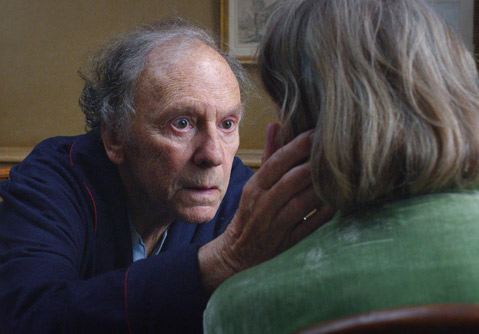Amour
Jean-Louis Trintignant, Emmanuelle Riva, and Isabelle Huppert star in a film written and directed by Michael Haneke.

In effect, the sobering yet relevant Amour comes equipped with a pair of introductory reality-check sequences, in after-and-before sequence. In the second scene, after the brief opening alert of the film’s blunt, telling title, we come face-to-face with another audience. After a few minutes of a static face-off, as the bracing opening blast of Schubert’s Impromptu D. 899 is followed by gentler musings, we realize that the elderly couple at the heart of this coolly poignant end-of-life saga are at a piano recital, just before the slow-brewing storm of the wife’s (Emmanuelle Riva, in a truly remarkable performance) slow demise into an ever-thickening fog.
That disarming opening is one of many clever and significant touches that Austrian director and screenwriter Michael Haneke slyly folds into his calm, quiet, and totally gripping film. Here, he artfully mixes filmic poetry and careful ellipsis of story elements, but the story’s underlying reality and universal themes quickly become a mirror to our own, fending off the distancing swagger of “it’s only a movie” indifference.
Haneke’s skill involves an understated storytelling style and sensitivity to the message and the sensual textures of each shot. What may seem like a casual glimpse of this couple’s everyday life under these trying circumstances can carry deeper significance. In one scene, the husband (Jean-Louis Trintignant) tells his wife about seeing a film that drove him to tears but the details of which he can’t remember, a notion which serves as a guide to how to appreciate this film: It’s the thought and emotion that count. Late in her more lucid period, the wife interrupts dinner to slowly gaze at vintage photos of herself, uttering the epitaph, “It’s beautiful. Life. Long life.”
Partly because of the rarity of the end-of-life mise-en-scène at the movies, Amour is immediately reminiscent of the Austrian film Coming of Age, an award-winning favorite of this year’s Santa Barbara International Film Festival, but Amour’s expressive language and the arc of the narrative are something very different. Whereas the other film details a last romantic fling of a couple kicking at societal propriety and the failing of the light, Amour is a sad last chapter in a long love affair, unfolding slowly yet surely in a Parisian apartment. It’s a powerful reflection on mortality, the fight for dignity, and the enduring power of love, in a way that has never quite graced the screen before.ry>



